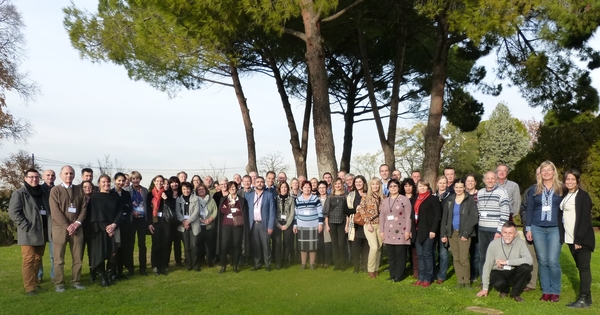Summary
ECPGR Workshop “Assessing current practices and procedures to strengthen AEGIS”
The ECPGR Workshop “Assessing current practices and procedures to strengthen AEGIS”, sponsored by the German Federal Ministry for Food and Agriculture and organized in collaboration with the Instituto Nacional de Investigación y Tecnología Agraria y Alimentaria (INIA), was held at Centro Nacional de Capacitación Agraria (CENCA), San Fernando de Henares, Madrid from 10 to 12 December 2018. The 59 participants, including policy/decision-makers, ECPGR National Coordinators, Associate Member institutes of AEGIS, genebank curators, members of ECPGR Crop Working Groups and a representative from the Crop Trust, were invited based on expressions of interest received from a representative group of countries and institutes, wishing to learn from each others’ experiences with the establishment and operation of AEGIS.
The Workshop was a follow-up to the agreement reached at the Steering Committee meeting in Thessaloniki in 2018, to hold a workshop on AEGIS before the end of 2018. The slow progress of AEGIS had been noted, mainly on the basis of the low number of accessions flagged in EURISCO as part of the European Collection. The agreed objectives of the Workshop were:
- To provide information at all levels about scope and importance of AEGIS (targeting relevant stakeholders);
- To offer examples of positive policy engagement;
- To offer examples of mechanisms to identify accessions to be included in the AEGIS European Collection;
- To identify reasons why the process is slowed down at different levels and offer solutions; and
- To facilitate AEGIS activities during Phase X.
The meeting was conducted in a very constructive and positive atmosphere which enabled the achievement of a list of very encouraging Action Points, together with the responsible person/entity and a deadline for the delivery, thus addressing the Workshop objectives.
The main Action Points (full details in pdf below) include the preparation of a letter of intent that would allow France to become AEGIS member during 2019; clarifications and adjustments of the selection and flagging procedures of accessions to be included in the European Collection; implementation of AQUAS elements, including the testing of the proof of concept of a peer review approach; follow-up steps to address the handling of vegetatively propagated crops, including phytosanitary and long-term safety back-up aspects; clarification about the inter-relationship between AEGIS, the International Treaty and the Nagoya Protocol; increasing the visibility of AEGIS activities and accessions; strengthening the capacity of Associate Members to effectively implement AEGIS; approaches to obtain additional funding; and to prepare a letter to the Ministries of Agriculture to highlight the results of the Workshop and to stress the value and importance of AEGIS for European agriculture and food security.
Based on expressed intentions of the participants, the expectation for 2019 is that the membership of AEGIS could be extended at least to France, Serbia and Spain. The European Collection should substantially increase its size, the quality standards are expected to be agreed for most crops and the blueprint of a quality monitoring system should be tested.
- Action Points (153,8 KB)
- PDF of this summary (424,4 KB)
- Programme (156,5 KB)
- List of participants (106,4 KB)
- Background document for the Workshop (238,9 KB)
- Travel reimbursement form (508,5 KB)
Related Information
- Workshop "Assessing current practices and procedures to strengthen AEGIS"
- Presentations given during the workshop
- Visit to the Spanish National Genebank




